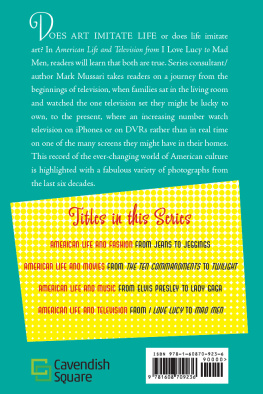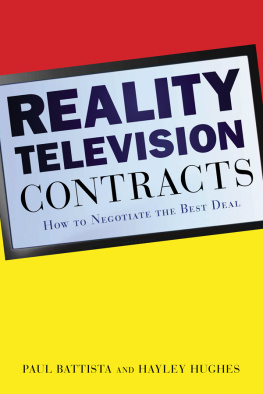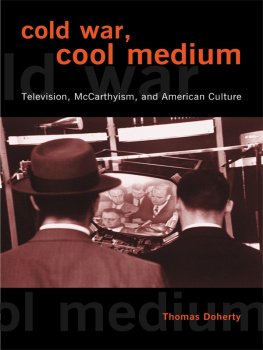The AGE of Television
The AGE of Television
With a new introduction by the author
Martin Esslin
Originally published in 1982 by W. H. Freeman and Company
Published 2002 by Transaction Publishers
Published 2017 by Routledge
2 Park Square, Milton Park, Abingdon, Oxon 0X14 4RN
711 Third Avenue, New York, NY 10017, USA
Routledge is an imprint of the Taylor & Francis Group, an informa business Copyright 2002 by Taylor & Francis.
All rights reserved. No part of this book may be reprinted or reproduced or utilised in any form or by any electronic, mechanical, or other means, now known or hereafter invented, including photocopying and recording, or in any information storage or retrieval system, without permission in writing from the publishers.
Notice:
Product or corporate names may be trademarks or registered trademarks, and are used only for identification and explanation without intent to infringe.
Library of Congress Catalog Number: 2001041529
Library of Congress Cataloging-in-Publication Data
Esslin, Martin
The age of television / Martin Esslin ; with a new introduction by the author.
p. cm. Originally published: San Francisco : Freeman, 1982. Includes bibliographical references and index. ISBN 0-7658-0888-9 (pbk : alk. paper) 1. Television broadcastingSocial aspectsUnited States. I. Title.
PN1992.6 .E87 2001 2001041529
302.23'45'0973dc21
ISBN 13: 978-0-7658-0888-2 (pbk)
Introduction to the Transaction Edition
HEARING THAT THERE IS still a demand for The Age of Televisiontwenty years after it first appearedcame as quite gratifying news to me. As I had not read it in a long time, I saw that while the relentless rush of new technological development has changed the landscape of electronic media beyond all recognition during these two decades, the essential message I was concerned with remains valid. My main objective was to show that the decisive cultural and social change wrought by televisionwhich has become the main medium transmitting information in Western civilizationwas a major shift in the way in which the world is perceived by the average human being. While purely verbal communication is linear and thus highly focused, visual communication is multifaceted and diffuse. Thus television, taking the form of a framed moving picture, tends towards becoming an essentially dramatic medium, so that information about the real world becomes more and more difficult to distinguish from fiction, while soap operas often seem more real than news reports.
The various dangerous implications of this phenomenon formed the main concern of the book. Political argument, for example, would become much more dramatic, and hence focus on personalities rather than be based on reasonable intellectual debate. Also, it was frightening for an outsider like myself, living and working in the United States, to see the amount of advertisements constantly interrupting the visual floweven of soap operaswhich, for people growing up in such an environment, must, over time, inevitably lead to a loss of the ability to concentrate. (In the meantime, most of the European public service channels, which were meant to run without being financed by advertising, have been increasingly forced to supplement their income by airing commercials, creating the same dangers in most European countries.) Hence, my discussion of alternative, less socially and culturally damaging ways of controlling and financing television services in the future has, I believe, become more relevant than it was twenty years ago.
* * *
How then, in this and other respects, has the situation changed since the early 1980s?
Above all, there has been a proliferation of television channels due to the vast increase in cable and digital transmission, bringing with it a hyperinflation of available programming, giving each viewer a truly bewildering choice. While in theory this seems an improvement, in practice it tends to tempt the viewer to switch channels at the slightest loss of immediate interest. It thus leads to a further lessening of attention span and concentration, and an increase in the fragmentation and impulsiveness of thinking and reasoning. Just as the invention of the printing press, over time, reduced the human capacity to remember long texts and recite them by heart, the effects of jumping from one unfinished impression to the next, seldom holding on until the end of a story or argument, are bound to have equally momentous consequences should they remain unchecked through succeeding generations.
The profusion of television channels increasingly leads to a system of generic channelsanyone wanting news, sports, films, art programming, or any other types of entertainment or information can get it whenever he or she wants by switching to a channel exclusively providing that type of output. This would seem a positive development as it gives each individual the freedom to make up, as it were, his or her own menu of what he or she wants to watch. But in actuality it leads to the relegation of more culturally or socially demanding educative and informative material to self-contained "ghettos," When there was a strictly limited number of channels, programmers were forced to include material of all typesand this could lead to more culturally valuable programs being seen by viewers who would not have sought them out on their own initiative. Hence the very existence of "arts," "discovery" or "science" channels relieves the still remaining comprehensive networks from producing or screening such material, thus further depressing their already low intellectual programming levels.
* * *
Twenty years ago, the television set's electronic eye was the only such screen in the average home in the Western world. Today, a multitude of very similar screensthe video units or monitors of personal computerscan be found in most homes, offices and schools. In that sense television technology has entered the daily lives of a very large portion of the population. Of course, video games, the Internet and e-mail are not the same as television, but they share vital aspects of television's technology and some of its main characteristics.
Video Games
Video games, for instance, are an essentially dramatic medium: they are plays in which the spectator intervenes in the action. It can be reasoned, then, that they fulfil the ambitions of many avant-garde playwrights of the past who dreamed of an audience's active involvement in the drama. Yet, with all their increasing sophistication and complexity, these games are primitive, dehumanised drama: they may be visually splendid and involve spectacular characters, but in the majority of cases their plot lines remain one of pursuit and capture. They involve, like stereotypical violent pursuit sequences of the traditional television thriller or police story, a multitude of gunning-downsin other words, pointless and imaginatively barren violence.
These games may sharpen the players' keenness of eye, speed of reaction and manual dexterity, but on the other hand they involve him or her in a world even more removed from human reality than the melodramatic plots of soap operas or the euphemistic banter of chat shows. The world of video games instead has much in common with that of the cheaply produced animated cartoons that fill the television screens during the morning hours of American weekends. They present a world in which characters fall dead, or are brutally squashed and flattened, only to pop up again unharmed. Whether one believes that such material is liable to deaden children's sensitivity towards violence, or that it may serve as a healthy outlet for tendencies that would otherwise manifest themselves in more concrete form, one thing to me appears clear: they cannot but debase the younger generation's artistic taste.






